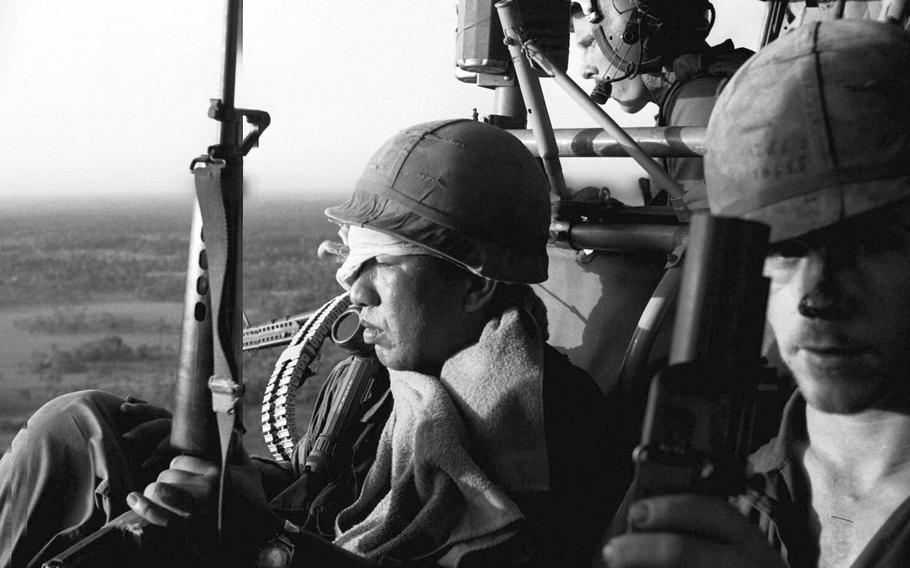
Wounded soldiers are evacuated from an area near Dau Tieng, Vietnam, in November, 1966. (Kim Ki Sam/Stars and Striupes)
CU CHI, Vietnam — I can't believe I'm all in one piece today. My body is sore all over and all my muscles ache.
I spent all afternoon Friday lying face down in a clump of jungle bushes, trying to make as small a target as possible while the Viet Cong threw automatic weapons fire and mortar shells at us.
And when I got out, Friday night, everybody said I was lucky.
I'd gone out that morning about 12 miles east of Tay Ninh, to an area near Dau Tieng. I joined a battalion of the 25th Inf. Div. that had made contact with the enemy the day before.
Just before noon, we moved out along a trail into thick jungle. We'd been walking about 15 minutes when the Viet Cong hit us hard with heavy automatic rifle fire and mortars. We scattered and I dove to the left of the trail, behind a tree that had been knocked down by an artillery shell in an action sometime in the past.
Next to me American troopers were returning the fire with M-16 rifles and grenade launchers.
The hidden Viet Cong had opened fire on our left flank from well-fortified bunkers dug in along the trail. Then they sent out snipers to pick us off from the right flank.
I've been in other battles in Vietnam, but this seemed like the worst.
We were taking casualties and I could hear Americans shouting directions or calling for medics.
After about 30 minutes, there was a slight lull in the fighting and I took the opportunity to crawl to a small clump of bushes where I would have better concealment.
I jumped in and found that I was sharing my new position with the battalion commander, a major, and two radiomen.
(I found out later the major was the son of a general I knew in Korea.)
About 2 p.m. the major used the radio to call his artillery support in closer.
"There are about 100 VC trying to make a suicide attack on our perimeter," he said, as nearly as I can remember. He wanted the artillery walked in to about 50 yards from our farthest troops. Pretty close. The major was very calm.
Just then a mortar round hit about seven yards from where we were. I was lying jammed face down between the radioman and the major. The radio cord was only about four feet long and it was stretched under my neck.
Fragments from the bursting round hit the major, on my left, and the radioman on my right. The major caught a fragment in his right elbow, and the radioman got hit in the left arm and cheek — the side nearest me. I didn't get a scratch.
I spent the rest of the afternoon with my face buried in the dirt. Once in a while I snapped pictures but the VC automatic weapons fire was coming in very low and I didn't have a helmet.
It seemed like a long, long afternoon.
About 4 p.m. two medics came by carrying a young G.I. who'd taken a pretty bad wound in the leg. He saw me lying there without a helmet and he threw me his as they carried him past.
"Here, sir! Take this," he said, and he tossed it to me.
Late in the afternoon reinforcements were flown in arid a landing zone was secured so the wounded could be taken out.
The last helicopter had space for one more. They asked if I wanted to go. I went.